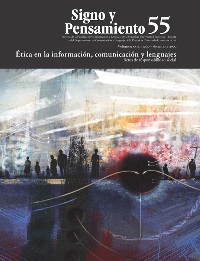Resumo
La techno-éthique (TE) est un domaine de recherche interdisciplinaire qui étudie tous les aspects éthiques et moraux de la technologie dans la société (Mitcham, 2005; Luppicini, 2008). L’objectif de cet article est de mener une réflexion autour des questions suivantes : Quelle place occupe la techno-éthique dans une société de l’information et de la communication? Quels en sont les défis en ce qui concerne l’éthique et la responsabilité sociale en communication? Cet article contribue à enrichir la discussion théorique autour du rôle de la techno-éthique dans une société de l’information et de la communication. Pour ce faire, nous interrogeons les liens entre technique et éthique dans le but de mieux comprendre les problèmes et les possibilités relatifs à l’éthique et à la responsabilité sociale des organisations et de la société.
Boczkowski, P. (1999). Mutual shaping of users and technologies in a national virtual campus. Journal of Communication, 49, 86-106.
Dalkir, K. (2005). Knowledge management in theory and practice. Burlington: Elsevier Butterworth-Heinemann.
Habermas, J. (1989). Discourse ethics: Notes on a program of philosophical justification.
Hakken, D. (2003). The knowledge landscapes of cyberspace. ny: Routledge.
Internet Architecture Board. (1989). Retrieved June 4, 2007, from http://tools.ietf.org/html/ rfc1087University of Chicago Press.
Jenkins, H. (2006). Convergence culture: Where old and new media converge. ny: nyu Press.
Jenkins, P. (2001) Beyond tolerance: Child pornography on the Internet. New York University Press: New York.
Johannesen, R. (2008). Ethics in human communication (6th edition. ny: Waveland Press. Retreived February 1, 2009 from http://www. newsweek.com/id/45548/
Knorr-Cetina, K. (1999). Epistemic cultures: How the sciences make knowledge. Cambridge, ma: Harvard University Press.
Latour, B., & Woolgar, S. (1986). Laboratory life: The construction of scientific facts. Princeton University Press, Princeton, NJ.
Luppicini, R. (2008). The emerging field of technoethics. In R. Luppicini & R. Adell (Eds.), Handbook of research on technoethics (pp. 1-19). Hershey, pa: Information Science Reference.
McLuhan, M. (1964). Understanding media: The Extensions of Man. Toronto: McGraw Hill.
McLuhan, M. (1962). The Gutenberg galaxy. Toronto: McGraw Hill.
Merz, M. (2006). Embedding digital infrastructures in epistemic cultures. In C. Hines (ed.), New infrastructures for knowledge production: understanding e-science (pp. 100-115). Hershey, Idea Group.
Meyrowitz, J. (1985) . No sense of place: The impact of electronic media on social behavior. New York: Oxford University Press.
Meyrowitz, J. (1994). Medium theory. In D. Crowley and D. Mitchell (eds.), Communication theory today (pp. 50-77). Stanford: Stanford University.
Mitcham, C. (2005). Encyclopedia of science, technology, and ethics (Ed.) Detroit: Macmillan Reference usa.
Mitchell, R., & Thurtle, P. (2004). Data made flesh: Embodying information. ny: Routledge.
Nentwich, M. (2003). Cyberscience: Research in the age of the Internet. Vienna: Austrian Academy of Science Press.
Palm, E., & Hansson, S. O. (2006). The case for ethical technology assessment (eTA). Technological Forecasting and Social Change, 73, 543-558.
Patterson, P., & Wilkins, L. (2004). Media ethics: Issues and cases (5th edition). ny: McGrawHill.
Phillips, R., & Freeman, E. (2003). Stakeholder theory and organizational ethics. Berlin: Berrett-Koehler Publishers.
Postman, Neil. (1992) Technopoly: The surrender of culture to technology. New York: Vintage Books.
Real, M. (1975). Cultural studies and mediated reality. Journal of Popular Culture 9 (2), 81-5.
Redding, W. C. (1996). Ethics and the study of organizational communication: When will we wake up? In J.A.J.M.S. Pritchard (Ed.), Responsible communication: Ethical issues in business, industry, and the professions (pp. 17-40). Cresskill, nk: Hampton Press.
Regan S. (1996). Is there free speech on the Internet? Censorship in the global Information infrastructure. In R. Shields (ed.) Cultures of Internet virtual spaces, real histories, living bodies. London: Sage.
Ribble, M., & Bailey, G. (2004). Digital citizenship: Focus questions for implementation. Learning & Leading with Technology, 32(2), 12-15.
Robbins, S., & Judge, T. (2007). Organization Behavior (12th ed.). Upper Saddle River, New Jersey: Pearson Prentice Hall.
Roberts, L. D. (2008). Cyber identity theft. In R. Luppicini & R. Adell (Eds.), Handbook of research on technoethics (pp. 542-557). Hershey, PA: Information Science Reference.
Roberts, L. D., & Parks, M. R. (1999). The social geography of gender-switching in virtual environments on the internet. Information, Communication & Society, 2, 521-540.
Sanders, K. (2003). Ethics and journalism. London: Sage Publications.
Schilling, G. (2000). The virtual observatory moves closer to reality. Science, 289, 238-239.
Sterne, J. (2003). The audible past: Cultural origins of sound reproduction. Duham: Duke University Press.
Sutherland, N., Isaacs, P., Graham, P., & McKenna, B. (eds.) (2008). Towards humane technologies: biotechnology, new media, and ethics. Rotterdam: Sense Publishers.
Turtle, P. & Howard, P. (eds). (2002). Semiotic Flesh: information and the human body. Seatle: University of Washington Press.
Vanderburg, W. H. (2005). Living in the labyrinth of technology. Toronto: University of Toronto Press.
Visala, S. (2008). Planning, interests, and argumentation. In R. Luppicini & R. Adell (eds.) (2008). Handbook of research on technoethics (pp 103-110). Hershey: Idea Group Publishing.
Visser, W., Matten, D., Pohl, M., &. Tolhurst, N. (eds.). (2008). The a to z of corporate social responsibility. New York: Wiley.
Wenger, E. (1998). Communities of practice: learning, meaning, and identity. Cambridge: Cambridge University Press.
Williams, R. (1975). Television: Technology and cultural form. New York: Schocken.
Wilson, C. (2005). Computer attack and cyberterrorism: Vulnerabilities and policy issues for Congress.
Esta revista científica está registrada sob a licença Creative Commons Attribution 4.0 International. Portanto, este trabalho pode ser reproduzido, distribuído e comunicado publicamente em formato digital, desde que os nomes dos autores e da Pontificia Universidad Javeriana sejam mencionados. Você pode citar, adaptar, transformar, auto-arquivar, republicar e desenvolver o material, para qualquer finalidade (inclusive comercial), desde que reconheça adequadamente a autoria, forneça um link para o trabalho original e indique se foram feitas alterações. A Pontificia Universidad Javeriana não retém os direitos sobre os trabalhos publicados e o conteúdo é de responsabilidade exclusiva dos autores, que mantêm seus direitos morais, intelectuais, de privacidade e publicidade.


